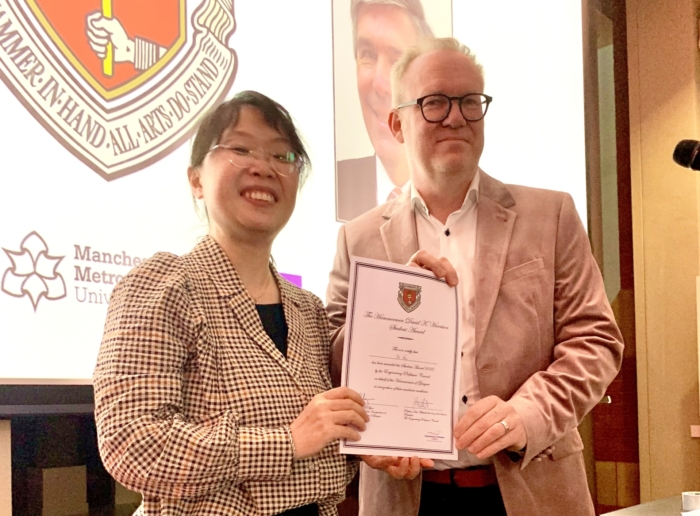Proposals are invited from higher education Engineering departments to host the Engineering Professors’ Council Annual Congress in 2020 or 2021.
‘Hosting the 2018 Engineering Professors’ Council Congress was a great way to showcase the University’s work to a wide range of experts in the field as well as to the professional bodies in engineering. Our staff and students gained a lot from explaining their approach to engineering education and research, and we were also able to explore new collaborations to broaden the reach of our engineering activities. We were delighted to welcome the EPC to Harper Adams and hope that other universities taking the opportunity act as the venue for the Congress will gain as much from the experience as we have.’
David Llewellyn, Vice-Chancellor, Harper Adams University (hosts of the 2018 Annual Congress)
The Annual Congress is the flagship event in the EPC calendar, an opportunity for engineering academics from across the UK to come together to explore policy and practice and to network.
Download guidelines.
Download the form for submitting a proposal.
Each year, Congress is hosted by a different institution:
The Congress usually takes place in April or May and lasts two days with a reception on the evening before the Congress formally starts.
- 2016: The University of Hull hosted Congress as a prestigious addition to its preparations as European City of Culture.
- 2017: Coventry University hosted taking the opportunity to demonstrate the city’s close associated with transport engineering and manufacturing.
- 2018: Harper Adams University displayed its cutting edge status as a leading centre of agricultural engineering including automated farming and a range of off-road vehicles.
- 2019: UCL is host for this year’s congress where its proximity to the seat of Government has allowed an amazing line-up of high-profile speakers on a range of policy issues at a time of historic challenges.
The host institution nominates a Congress Convenor who will become a member of the EPC Board for up to three years (2019-21 for the 2020 Convenor; 2020-22 for the 2021 Convenor) and who, with guidance from the EPC executive team, will lead the organisation of the Congress, including determining the themes and scope for the Congress, and the speakers and events.
We are inviting bids to act as host for either of the next two years. You can specify one year or the other or apply without choosing a year. We will not select the same host for both years.
Download guidelines.
Download the form for submitting a proposal.
To submit a proposal, complete the form here and email it to Johnny Rich, Chief Executive, at j.rich@epc.ac.ukby 19thJune 2019. Johnny can also be contacted at the same address or by phone on 078-1111 4292 to discuss any aspect of Congress or the proposal process.
What is expected from the host
The host institution (host) would be expected to provide:
- an academic of suitable standing to act as Convenor and other staff resource as necessary to assist planning the Congress;
- suitable function rooms such as a lecture theatre and smaller break-out rooms, as well as space for networking;
- catering for the Congress;
- possibly accommodation, particularly, for early career staff delegates to the Congress who may be provided free accommodation in student residences;
- management of the Congress during the event;
- financial accountability in accordance with the financial arrangements (see below).
There will be some support from the EPC executive, but it is advisable to ensure that the host can provide conference support staff as the smooth running of the Congress will primarily be the Convenor’s responsibility.
The Congress usually attracts up to 100 delegates, but the numbers have grown in recent years and the host should be able to provide for 150.
Selection process
The process for selection as host involves submission of your proposal to the EPC Board, which will conduct a vote. The basis for its decision is entirely at its discretion, but they will take into account issues such as the nominated Convenor, the suitability of the facilities, the arrangements for costs, the geographical suitability (although the EPC is keen not always to be restricted to big centres of population), the suggested activities such as Congress Dinner venue and other attractions, and other arrangements to ensure the smooth running of the Congress.
The host institution must be a member of the EPC. We would particularly welcome joint proposals from separate institutions to host jointly, such as two engineering departments at separate universities in the same city.
Financial arrangements
The suggestion for the financial arrangement between the EPC and the host forms part of the proposal. The EPC will seek to minimise its risk and, if possible, would like to generate a surplus from the event to contribute to its own in-house costs in running the Congress. However, the quality of the event and its appeal to members will be of greater weight in selecting the host institution.
That said, it may be helpful to provide as guidance the following arrangement that has been used in the past. The EPC would hope that the host would aim to meet at least this arrangement:
Costs may be divided into three categories as follows:
- ‘External costs’: ie. costs that will genuinely have to be met, such as catering, external venue hire, student ambassadors, etc. The EPC would guarantee all these external costs and, if necessary, would pay them up-front. In any case, the EPC would be liable for these costs.
- ‘Internal costs’: such as staff who are already employed by the host. The host would guarantee these costs and, in the event that registration income was insufficient to meet them, the host would be liable for them.
- ‘Internal fees’: where the only cost to the host is a notional price that it sets internally – room hire, for instance. Once the two types of costs above have been met from revenue, 75% of any remainder may be used to defray the host’s internal fees and the other 25% will be due to the EPC to defray our internal costs and fees. After the host’s internal fees have been met, any surplus would be split equally.
The proposal should make it clear whether the host proposes to manages the bookings process and receive the registration fees or would prefer this to be handled by the EPC. If the host receives the fees, after the Congress it will be expected to provide a full account of income and expenditure (outlining the categories of expense as above, if that model is used). If the EPC receives the fees, the host may invoice the EPC for costs in accordance with the agreement. In either case, the host will be expected to agree with the EPC a full budget for the Congress at the earliest opportunity (and before substantial Congress planning) and would not be entitled to incur costs on behalf of the EPC outside the agreed budget without separate agreement.
While the host will be responsible for setting the registration fees and packages for delegates, these must be agreed in advance with the EPC. These should not include a more than 10% increase on equivalent packages for the previous year. A significant number of places for early careers staff (not more than 5 years in an academic post) should be made available at the lowest possible rate (including, ideally, some complimentary places).
In some years, the host has acted as a major sponsor of the event contributing to the costs or not passing on some or all of the costs it incurs. Any such support would be acknowledged and the EPC will seek to support the host’s objectives in sponsoring Congress. Any other sponsorship revenue will normally be retained by the EPC or used to offset the costs of running the Congress.




